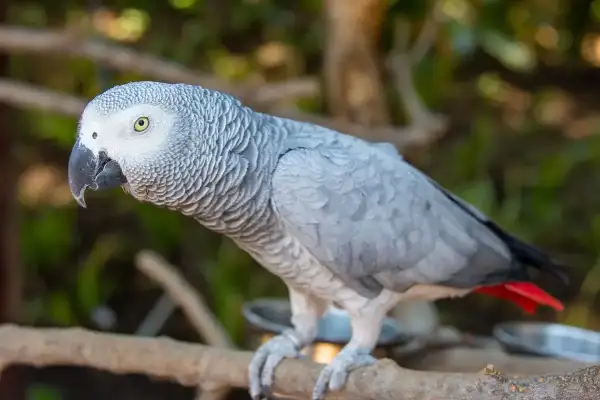African Grey Parrot Care Guide
Widely considered to be one of the most intelligent birds, the African Gray Parrot is not for beginners as a high-maintenance pet African Grey Parrot care requires hours of daily attention and plenty of space for the bird to keep them happy and healthy.
African Greys live up to 60 years in captivity.
African Grey Parrot Size:
African Greys are medium-size parrots, averaging around 13 inches at full maturity and with a wingspan of up to 22 inches.
African Grey Parrot Care:
As mentioned already, African Greys are highly intelligent parrots. They can’t just accumulate a huge vocabulary but have also demonstrated the aptitude for recognizing the meanings of words and phrases.
You’re going to want to provide your Grey with lots of toys that will challenge their deep intelligence and keep their minds occupied. Foraging and puzzle toys are excellent for this.
They also require lots of activity (exercise) to remain healthy. A minimum of two hours each day outside of their cage to move around, explore, and engage with their human owner is suggested.

If you don’t provide them with both attention and toys that challenge them, African Greys can become depressed and begin self-mutilating by plucking out their own feathers.
But, keep their minds stimulated with attention, training them to talk and do tricks, and challenging toys and African Greys make wonderful companion pets. Some claim that leaving a television or radio playing when the bird is left alone also helps to keep them stimulated and happy.
African Grey Parrot Diet:
Greys are frugivorous, eating mostly fruits, nuts, and seeds, though they’ll happily chow down on flowers, tree bark, and insects. You may want to keep your potted flowers up high when letting your Grey play outside of its cage.
African Grey Parrot Habitat:
Here is where the decision to keep an African Grey is really made for most people because they require a nice large cage to be happy and healthy and many homes simply don’t have the space.
Whatever cage you keep your African Grey in, it should be kept against a wall and not located in the middle of a room. This provides a sense of security for the bird and helps to avoid stress.
African Grey Parrot Behavior:
The African Grey is a social and friendly bird, though they don’t like to be “cuddled” usually, they do enjoy lots of other hands-on interaction with their owner.
They also tend to be one-person sort of birds, attaching deeply to a single owner, thus aren’t really the best pet birds for large families.
African Grey Parrot Care Conclusion:
For anyone with the room and time to commit to an African Grey, there’s almost no other pet bird that is comparable. They’ll keep you company and keep you amused with their massive vocabulary and constant energy, and given they can live up to 60 years you’re really gaining a “friend for life” when you bring one home.
You can go deeper into this species of bird here.
African Grey Parrot Care FAQ:
Do African Greys make good pets?
These highly intelligent and social birds can be a wonderful pet and companion for adults and seniors, however, they can be demanding and a handful to keep so aren’t suggested for first-time bird owners or children.
Do African Grey Parrots talk?
Absolutely, in fact, they can have the largest vocabularies of all speaking birds and have even been found to recognize the meanings of words and phrases.
Should I cover my African Grey at night?
Some will say that as long as you provide a dark and quiet area that it may be fine not to cover the cage at night, however, our suggestion is to never risk stressing your bird and always play it safe by covering their cage at night.
How can I get my African Grey to trust me?
Positive rewards and patience. Constant positive reinforcement as you socialize with your bird, giving verbal praise and treats when your African Grey interacts with you or others. These birds are emotional and intelligent so just be patient and consistent with the praise and rewards.
Do African Grey Parrots need a companion?
The African Grey is a particularly social bird and does better with constant attention and companionship. They’re known to form deep relationships with their mates or human owners, so if you won’t have plenty of time to devote to engaging with them every day it is suggested to provide them with a companion.
Nicholas Burns – Veterinary Technician, amateur Ornithologist
Nick has volunteered at bird rescues since he was a teenager and worked as a veterinary technician for almost two decades. He has extensive experience with animal care and a special love for birds, especially his African Grey, Scrooge (who knows all the bad words!).